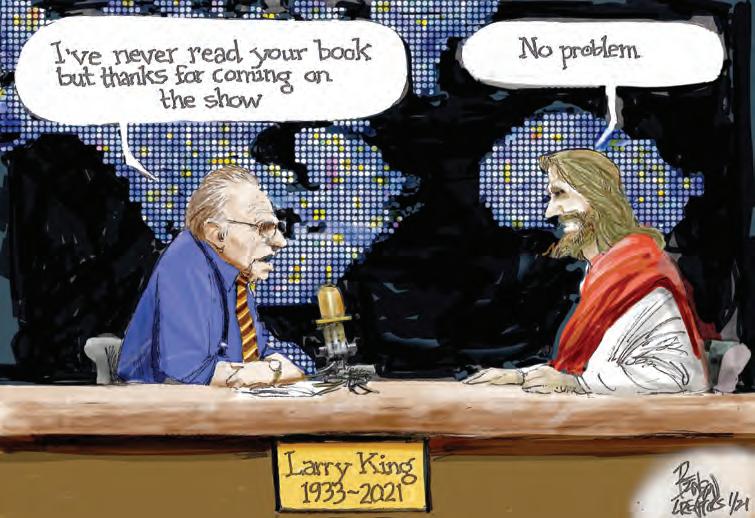
6 minute read
2 2
Tribune ConTenT agenCy
WASHINGTON — The Senate, split 50-50 between Democrats and Republicans, is moving forward with a power-sharing agreement after Minority Leader Mitch McConnell relented on an ultimatum over filibuster rules.
The two leaders had been in a standoff that had the potential to hobble President Joe Biden’s agenda and stymie legislative action.
“I am glad the Republican leader finally relented and we can move forward now to organize the Senate, set up committees chairs and ranking members, and a process for moving bills and nominees to the floor from committees with an evenly divided number of members,” Majority Leader Chuck Schumer said in a Tuesday floor speech. “I’m glad we’re finally able to get the Senate up and running. My only regret is that it took so long.”
The Senate has been operating without a deal, which froze committees from the previous Congress with Republicans holding the majority and all chairmanships. That left Schumer in charge of the floor while GOP committee chairmen, or at least those who did not retire and are still around, continued to run their panels.
The agreement, text of which has not yet been released, is modeled after the rules that governed the chamber the last time it was tied in 2001.
“Sen. Schumer and I’ll be able to adopt an organizing resolution that’s very close to exactly what was negotiated by Lott and Daschle after the 2000 election,” McConnell told reporters Tuesday, referring to the deal
Chip Somodevilla/Getty Images/TNS Senate Majority Leader Chuck Schumer and Senate Minority Leader Mitch McConnell walk side-by-side to the Senate Chamber at the U.S. Capitol.
former Senate Republican leader Trent Lott of Mississippi and Democratic leader Tom Daschle of South Dakota cobbled together for the last evenly split Senate.
Like the 2001 agreement, it provides for equal numbers of members on Senate committees, with a process for discharging bills and nominations that deadlock, effectively giving the Democrats a narrow advantage on setting the agenda on contentious issues.
It also provides for equal staffing levels and office space, which is made easier due to extensive remote work for many staff during the Covid-19 pandemic.
The 2001 deal included a provision that kept the majority and minority leaders at the time from using the process of filling the amendment tree, a procedural tool that precludes the offering of amendments.
Schumer suggested this may be replicated in the latest deal at a press conference Tuesday, calling the Senate under McConnell “totally closed.” But majority leaders of both parties, including Democrat Sen. Harry Reid, regularly blocked amendments.
“I hope we can get a more open process,” Schumer said in response to a question about the so-called amendment tree in the deal for the 117th Congress.
The filibuster, the procedural tool that effectively requires a 60-vote margin for most legislation, was the major issue for McConnell that had prevented the Senate from moving forward and organizing itself to this point. In recent years, McConnell eliminated the 60-vote threshold for Supreme Court nominees, and Reid killed the filibuster for lower court judges and most executive nominees when he led the chamber.
Many Democrats have called for the elimination of the legislative filibuster, as they take control of both chambers of Congress and the White House. But McConnell was holding firm, wanting a promise from the new majority leader that the filibuster, which provides the minority great sway over the agenda, would remain intact.
Democrats balked at McConnell’s request, calling for a powersharing agreement that closely aligned with the 2001 framework. That gave the party with the vice presidency and that position’s tie-breaking powers control of the floor agenda, without any additional caveats or provisions.
McConnell backed down Monday night after Democrats Joe Manchin of West Virginia and Kyrsten Sinema of Arizona reiterated their long-standing opposition to eliminating the filibuster.
“I’m glad we stepped back from this cliff,” said McConnell, touting the preservation of the filibuster as a victory.
The agreement is expected to be codified in a resolution that the chamber is expected to agree to. Once adopted, committees can move forward and organize, with Democratic lawmakers formally taking the gavels.
The Senate is already confirming Biden’s Cabinet nominees, which is expected to continue. The chamber confirmed Janet Yellen on Monday to be Treasury secretary on an 84-15 vote and confirmed Antony Blinken on Tuesday to be secretary of State on a 78-22 vote.
The president’s first legislative priority is a $1.9 trillion pandemic relief bill, which he hopes to move with GOP support. But if it doesn’t gain traction on the Republican side of the aisle, Democrats are already discussing using the budget reconciliation process to maneuver around the 60-vote requirement. That process allows certain tax and spending measures to move in the Senate with only a majority required for passage.
The Congressional Research Service provides a reminder that the 2001 agreement was largely unprecedented, not comprehensive and relatively fragile.

Deaf Americans welcome sight of ASL interpreters at White House news briefings
The WashingTon PosT
WASHINGTON — Regular news briefings have returned to the White House under President Joe Biden’s administration, but the faces behind the lectern aren’t the only changes coming to the James S. Brady Press Briefing Room in the West Wing.
An American Sign Language interpreter will now be a regular fixture at all White House news briefings, White House press secretary Jen Psaki announced Monday.
“The president is committed to building an America that is more inclusive, more just and more accessible for every American, including Americans with disabilities and their families,” Psaki said Monday as an interpreter named Rebecca appeared onscreen virtually signing the announcement.
The White House did not immediately respond to questions seeking more information on its ASL interpreters.
The move marks the first time a presidential administration will have regularly accessible news briefings using ASL, a step that was welcomed by the deaf and hard of hearing community.
“I felt a sense of fairness,” Robert Weinstock, a spokesperson for Gallaudet University in Washington, where all instruction and campus life activities take place using ASL, told The Washington Post on Tuesday.
Weinstock, speaking through an interpreter, said that the deaf community is happy that the White House was making briefings accessible, and that having an ASL interpreter – known as “terps” in the deaf and HOH community – makes watching the news more enjoyable.
Traditional broadcasts of the news briefings often have closed captions, but Weinstock noted that captions and ASL aren’t equivalent access.
“There is a lot of information in the fluidity that is provided [and] that’s really important, with a live person or a live briefing, for a person to interpret that information in real time,” he said. He added that interpreters don’t just convey words but also nonverbal cues such as tone and mood, which they relay with facial expressions and body language.
Closed captions can’t capture the full range of information– and they’re not always accurate, Weinstock said.
“If a person’s not familiar with that name, then the person typing out captions or hearing the name might not type it out correctly,” Weinstock said.
Biden staked out the importance of accessibility starting with his inauguration: His Presidential Inaugural Committee prioritized accessibility and provided ASL interpretation, live closed captioning and audio descriptions for the day’s events, NPR reported.
A highlight of the ceremonies was Georgia firefighter Andrea Hall, who led the Pledge of Allegiance in spoken word and simultaneously in ASL.
Biden’s experience with a more inclusive workplace dates to his time in the Obama administration, which featured several deaf or hard of hearing members.










